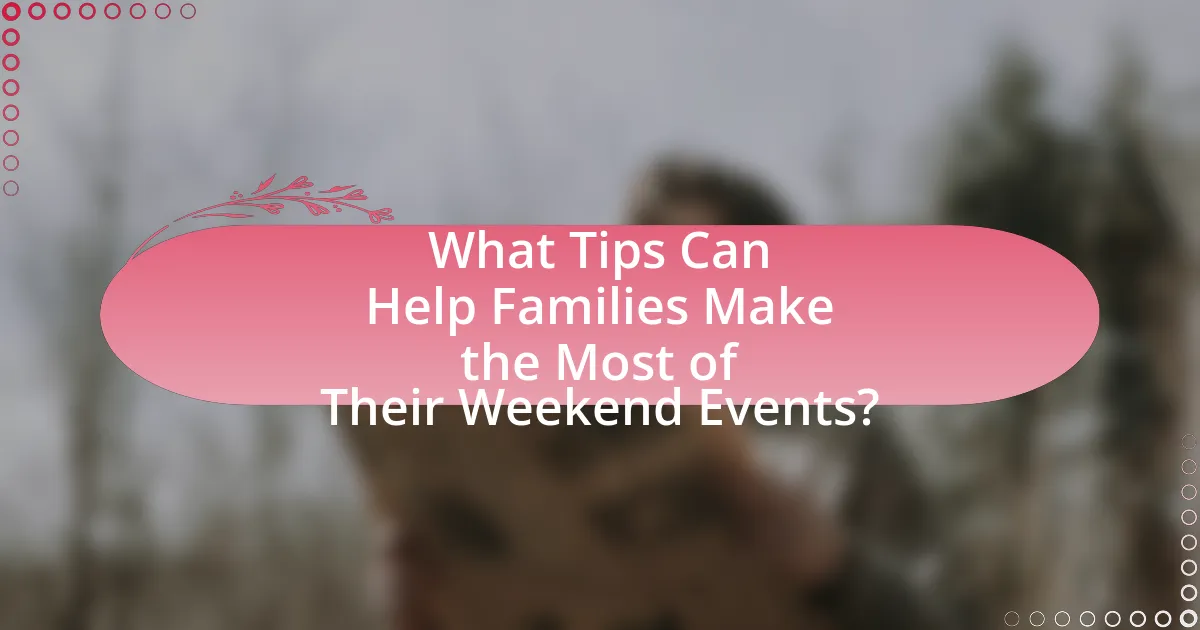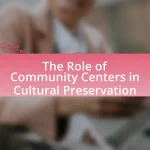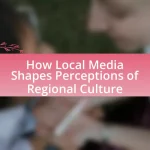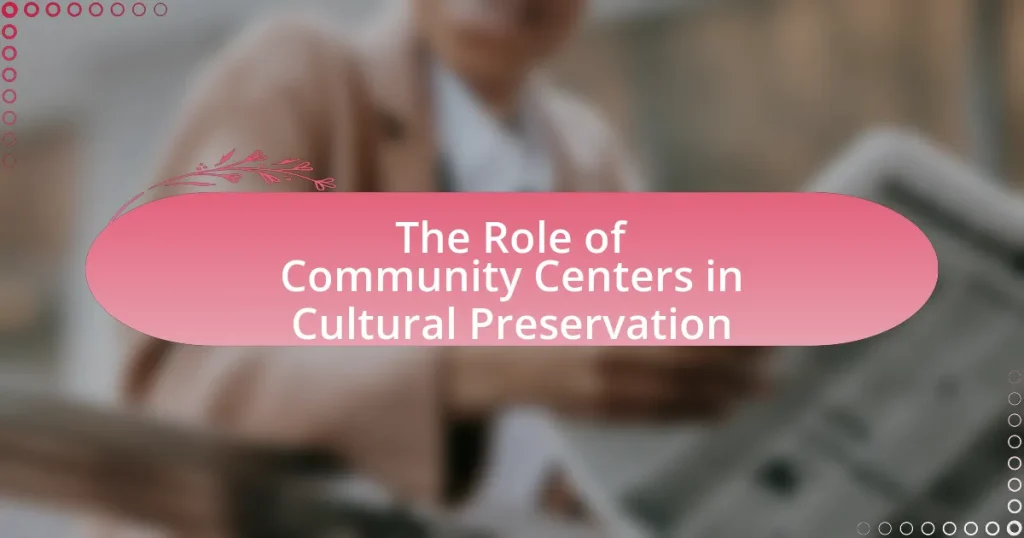Family-friendly events in the city encompass a variety of activities designed to engage families and promote community interaction, including festivals, outdoor movie nights, and children’s theater performances. These events are crucial for fostering social cohesion, enhancing child development, and encouraging civic engagement. The article highlights the importance of these events, outlines popular categories, and provides insights on how families can find suitable activities for the weekend. Additionally, it discusses tips for maximizing enjoyment, managing challenges, and ensuring a safe environment for children during public gatherings.
![What are Family-Friendly Events in [City]?](/wp-content/uploads/What-are-Family-Friendly-Events-in-[City]-1.webp)
What are Family-Friendly Events in [City]?
Family-friendly events in a city typically include community festivals, outdoor movie nights, children’s theater performances, and seasonal activities like pumpkin patches or holiday markets. For example, many cities host annual summer fairs featuring rides, games, and live entertainment suitable for all ages. Additionally, local parks often organize family-oriented events such as nature walks, educational workshops, and sports clinics. These events foster community engagement and provide enjoyable experiences for families.
Why are Family-Friendly Events Important for Communities?
Family-friendly events are important for communities because they foster social cohesion and promote inclusivity among diverse groups. These events provide opportunities for families to engage with one another, strengthening community bonds and enhancing the overall quality of life. Research indicates that communities with active family-oriented activities experience lower crime rates and higher levels of civic engagement, as families are more likely to participate in local governance and volunteer efforts. For example, a study by the National Recreation and Park Association found that community events can increase social interaction and trust among residents, leading to a more connected and resilient community.
How do these events foster community engagement?
Family-friendly events foster community engagement by providing opportunities for residents to connect, collaborate, and participate in shared experiences. These events encourage social interaction among families, creating a sense of belonging and community identity. For instance, local festivals often feature activities that require teamwork, such as games and workshops, which promote cooperation and strengthen community ties. Additionally, research indicates that participation in community events can lead to increased civic involvement, as individuals who engage in local activities are more likely to volunteer and support local initiatives.
What role do they play in child development?
Family-friendly events play a significant role in child development by providing opportunities for social interaction, skill-building, and emotional growth. Engaging in these activities allows children to develop social skills, such as communication and teamwork, as they interact with peers and adults in a supportive environment. Research indicates that participation in community events enhances children’s cognitive and emotional development, fostering a sense of belonging and community engagement. For instance, studies show that children who regularly participate in social activities exhibit improved emotional regulation and social competence, which are crucial for their overall development.
What Types of Family-Friendly Events Can Be Found in [City]?
Family-friendly events in a city typically include festivals, outdoor movie nights, community fairs, children’s theater performances, and educational workshops. For instance, many cities host annual festivals that feature activities such as face painting, live music, and interactive exhibits designed for children. Outdoor movie nights often provide a family-friendly atmosphere where families can enjoy films under the stars, while community fairs usually offer games, rides, and food stalls that cater to all ages. Additionally, children’s theater performances engage young audiences with entertaining and educational stories, and workshops often focus on arts and crafts, science experiments, or cooking classes tailored for families. These events foster community engagement and provide enjoyable experiences for families.
What are the most popular event categories?
The most popular event categories include music festivals, food and drink events, sports events, arts and crafts fairs, and family-friendly activities. These categories attract large audiences due to their diverse offerings and appeal to various demographics. For instance, music festivals often feature well-known artists and create a vibrant atmosphere, while food and drink events showcase local cuisine and beverages, drawing in food enthusiasts. Sports events engage fans through live competitions, and arts and crafts fairs provide a platform for local artisans, enhancing community engagement. Family-friendly activities, such as fairs and outdoor movie nights, cater specifically to families seeking enjoyable experiences together.
How do seasonal events differ from year-round activities?
Seasonal events occur during specific times of the year, while year-round activities are available consistently throughout the entire year. Seasonal events, such as holiday festivals or summer fairs, are often tied to particular dates or seasons, attracting participants based on the time-sensitive nature of the event. In contrast, year-round activities, like visiting parks or museums, provide ongoing opportunities for engagement regardless of the season. For example, a city may host a winter holiday market that operates only in December, whereas a local zoo remains open all year, allowing families to visit at their convenience.
How Can Families Find the Best Events for the Weekend?
Families can find the best events for the weekend by utilizing local event calendars, social media platforms, and community bulletin boards. Local event calendars, such as those provided by city websites or tourism boards, often list family-friendly activities, including festivals, fairs, and workshops. Social media platforms like Facebook and Instagram allow families to follow local organizations and venues that frequently post about upcoming events. Community bulletin boards, both physical and digital, often feature announcements for local gatherings, classes, and activities tailored for families. These resources provide a comprehensive overview of available options, ensuring families can choose events that suit their interests and schedules.
What resources are available for discovering local events?
Local events can be discovered through various resources such as community calendars, social media platforms, event websites, and local newspapers. Community calendars, often maintained by city or town websites, provide comprehensive listings of events happening in the area. Social media platforms like Facebook and Instagram feature event pages and local groups where users can find and share information about upcoming activities. Websites such as Eventbrite and Meetup specialize in listing events based on location and interests, making it easy to find family-friendly options. Local newspapers frequently publish event listings and articles highlighting activities in the community, serving as a reliable source for discovering events.
How can families assess the suitability of an event for their children?
Families can assess the suitability of an event for their children by evaluating the event’s age appropriateness, safety measures, and content relevance. Age appropriateness ensures that the activities and themes align with the developmental stages of children, which is crucial for engagement and understanding. Safety measures, such as crowd control, emergency protocols, and accessibility, are vital for protecting children during the event. Content relevance involves checking if the event’s themes and activities resonate with children’s interests and values, which can be determined through event descriptions and reviews. Research indicates that events tailored to specific age groups enhance children’s enjoyment and learning experiences, making it essential for families to consider these factors when choosing events.

What Are the Top Picks for Family-Friendly Events This Weekend?
This weekend, top picks for family-friendly events include the annual community fair featuring games, food stalls, and live entertainment, as well as a local children’s theater production of a popular animated movie. The community fair attracts over 5,000 attendees each year, showcasing local talent and providing activities for all ages. The children’s theater production has received positive reviews for its engaging performances and is expected to draw a full house, with tickets selling out quickly.
What Events Are Happening This Weekend in [City]?
This weekend in the city, several family-friendly events are scheduled. Notable events include a community fair at Central Park featuring local vendors and activities for children, a family movie night at the downtown library showcasing a popular animated film, and a weekend farmers market offering fresh produce and crafts suitable for all ages. These events provide opportunities for families to engage in fun and educational activities together.
What are the highlights of each event?
The highlights of each family-friendly event in the city include engaging activities, entertainment options, and community involvement. For example, the annual Family Fun Festival features interactive games, live performances, and food stalls, attracting families looking for a day of enjoyment. The Children’s Art Fair showcases local artists and offers hands-on workshops, promoting creativity among young attendees. Additionally, the Outdoor Movie Night presents family-friendly films under the stars, providing a unique viewing experience. Each event emphasizes inclusivity and fun, making them ideal for families seeking weekend activities.
What age groups are these events suitable for?
Family-friendly events in the city are suitable for a wide range of age groups, typically including children aged 0-12, teenagers aged 13-19, and adults. These events often feature activities designed to engage young children, such as interactive games and crafts, while also providing entertainment options for older children and adults, like live performances and workshops. The diversity of activities ensures that all family members can participate and enjoy the experience together.
How Do These Events Cater to Families?
Family-friendly events cater to families by providing activities and amenities that engage all age groups, ensuring a welcoming environment for parents and children alike. These events often feature kid-friendly entertainment, such as games, crafts, and performances, which are designed to be enjoyable and accessible for younger audiences. Additionally, many family-oriented events include facilities like changing stations, family rest areas, and food options that cater to children’s tastes, enhancing the overall experience for families. For example, community festivals frequently offer free admission for children and discounted family packages, making it financially feasible for families to participate together.
What amenities are typically available for families at these events?
Family-friendly events typically offer amenities such as designated children’s areas, family restrooms, and kid-friendly food options. These amenities are designed to enhance the experience for families, ensuring comfort and convenience. For instance, many events provide activities like face painting, crafts, and games specifically tailored for children, which engage younger attendees and allow parents to enjoy the event more fully. Additionally, some events may feature stroller rentals or family parking areas to accommodate families with young children.
How do organizers ensure a safe environment for children?
Organizers ensure a safe environment for children by implementing strict safety protocols and guidelines. These protocols often include background checks for staff and volunteers, ensuring that all personnel are trained in child safety and emergency procedures. Additionally, organizers may establish secure check-in and check-out processes to monitor children’s movements and prevent unauthorized access. For instance, events often utilize wristbands or identification tags for children, which helps in tracking and ensuring their safety throughout the event. Furthermore, organizers typically conduct risk assessments of the venue to identify and mitigate potential hazards, ensuring that play areas and activities are age-appropriate and supervised.

What Tips Can Help Families Make the Most of Their Weekend Events?
To make the most of their weekend events, families should plan ahead by selecting activities that cater to everyone’s interests and scheduling them in advance. Research indicates that families who engage in pre-planning experience higher satisfaction during outings, as it allows for smoother transitions and reduced stress. Additionally, incorporating a mix of educational and recreational activities can enhance the experience, as studies show that diverse experiences contribute to family bonding and enjoyment.
How Can Families Prepare for a Successful Event Experience?
Families can prepare for a successful event experience by planning ahead, which includes researching the event details, setting a schedule, and organizing necessary items. Researching the event allows families to understand the location, timing, and activities available, ensuring they can maximize their enjoyment. Setting a schedule helps families allocate time for travel, activities, and breaks, which is crucial for maintaining a positive experience. Organizing necessary items, such as snacks, water, and appropriate clothing, ensures that families are well-equipped to handle various situations during the event. These preparation steps contribute to a smoother and more enjoyable experience for all family members.
What essentials should families bring to events?
Families should bring food, water, sunscreen, first aid supplies, and entertainment items to events. These essentials ensure that families stay nourished and hydrated, protected from sun exposure, prepared for minor injuries, and engaged throughout the event. For instance, having snacks and drinks readily available helps maintain energy levels, while sunscreen protects against harmful UV rays, which is crucial during outdoor events. First aid supplies can address minor injuries, and entertainment items like games or books keep children occupied, enhancing the overall experience for the family.
How can families plan their schedule to maximize enjoyment?
Families can maximize enjoyment by prioritizing activities that cater to everyone’s interests and scheduling them during optimal times. Research indicates that planning family outings during weekends or school breaks enhances participation and enjoyment, as these times typically allow for more relaxed schedules. Additionally, incorporating a mix of activities—such as outdoor adventures, cultural events, and family game nights—ensures that all family members remain engaged. Studies show that families who engage in diverse activities together report higher satisfaction and bonding, reinforcing the importance of variety in planning.
What Common Challenges Might Families Face at Events?
Families often face logistical challenges at events, including managing schedules, coordinating transportation, and ensuring accessibility for all family members. These challenges can lead to stress and frustration, particularly when events are crowded or poorly organized. For instance, a survey by Eventbrite found that 60% of families reported difficulties in finding suitable activities that cater to various age groups, highlighting the need for better planning and communication from event organizers. Additionally, safety concerns, such as crowd control and child supervision, are significant issues that families must navigate during public gatherings.
How can families handle unexpected situations during events?
Families can handle unexpected situations during events by maintaining flexibility and open communication. When an unforeseen issue arises, such as bad weather or a schedule change, families should quickly assess the situation and discuss alternative plans together. Research indicates that effective communication within families enhances problem-solving abilities, allowing them to adapt to changes more efficiently. For instance, a study published in the Journal of Family Psychology found that families who engage in open discussions during stressful situations report higher satisfaction and cohesion. By prioritizing adaptability and dialogue, families can navigate unexpected challenges during events successfully.
What strategies can help manage children’s behavior in public settings?
To manage children’s behavior in public settings, establish clear expectations and consequences beforehand. Setting specific rules about behavior, such as using indoor voices or staying close, helps children understand what is expected of them. Research indicates that children respond positively to structured environments, which can reduce anxiety and improve compliance. For example, a study published in the Journal of Child Psychology and Psychiatry found that children with clear behavioral guidelines exhibited fewer disruptive behaviors in public. Additionally, positive reinforcement, such as praise or small rewards for good behavior, can encourage children to adhere to these expectations.










![Family-Friendly Events in [City]: Top Picks for the Weekend](https://carthagestandard.com/wp-content/uploads/Featured-image-Family-Friendly-Events-in-City-Top-Picks-for-the-Weekend-1024x538.webp)
![Upcoming Festivals in [City]: A Comprehensive Guide to This Season’s Celebrations](https://carthagestandard.com/wp-content/uploads/Featured-image-Upcoming-Festivals-in-City-A-Comprehensive-Guide-to-This-Seasons-Celebrations-150x150.webp)


